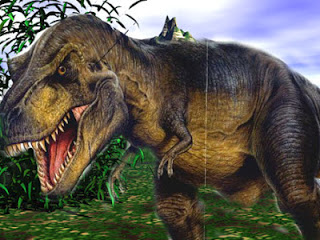Philosophy
 For the last hundred years since its discovery, Tyrannosaurus Rex has ruled the public imagination as the greatest and most ferocious predator to ever live on our planet. While we all love dinosaur movies, or to visit museums and stare endlessly at their impressive skeletal structures, no one (except perhaps for a few adrenaline addicted junkies) would want to be in the vicinity of a real hungry T-Rex...
For the last hundred years since its discovery, Tyrannosaurus Rex has ruled the public imagination as the greatest and most ferocious predator to ever live on our planet. While we all love dinosaur movies, or to visit museums and stare endlessly at their impressive skeletal structures, no one (except perhaps for a few adrenaline addicted junkies) would want to be in the vicinity of a real hungry T-Rex...
But was this even a predator? Could it have been no more than a mere scavenging vulture? What does the scientific evidence actually suggest? Well, because the data is limited and our access indirect and sometimes more circumstantial than definitive, there is a lot of speculation that has to go into these conjectures, so there are no conclusive answers just yet, but at least a few aspects of the evidence do raise some very interesting questions, as the following documentary shows:
- Is Addiction Itself Problematic?
I had lunch yesterday with my editors from Johns Hopkins University Press and one of them who ordered a cup of coffee was making light of her supposed caffeine addiction. It leads to the question whether such an addiction would be a problem. ...
- Historians, Archaeologists, And Scientists
Are historians scientists? They frame hypotheses about the causes and effects of real events and use empirical evidence to support their accounts. But they don't do not look for regularities to make into laws; to the contrary, they account...
- Is The Time Of Intellectual Revolutions Past?
A question came up in a seminar I'm team-teaching with a buddy in sociology. Is it possible to have another "Copernican revolution," that is, an idea so revolutionary that it changes the general worldview? Thomas Kuhn argues that we think...
- Midterm
MIDTERM EXAMINATION FOR INTRODUCTION TO PHILOSOPHY ONLINE COURSE Professor David Christopher Lane Directions: Place all of your answers on your personal website. Then send a link to your midterm to your teacher at [email protected]. Best...
- What Darwin Didn't Know
Darwin has become an icon of scientific virtue, not only because he sought naturalistic explanations for the biological phenomena around him, as well as the mechanisms through which nature, unaided by some supernatural force or agency, would gradually...
Philosophy
T-Rex - Warrior or Wimp?

But was this even a predator? Could it have been no more than a mere scavenging vulture? What does the scientific evidence actually suggest? Well, because the data is limited and our access indirect and sometimes more circumstantial than definitive, there is a lot of speculation that has to go into these conjectures, so there are no conclusive answers just yet, but at least a few aspects of the evidence do raise some very interesting questions, as the following documentary shows:
- Is Addiction Itself Problematic?
I had lunch yesterday with my editors from Johns Hopkins University Press and one of them who ordered a cup of coffee was making light of her supposed caffeine addiction. It leads to the question whether such an addiction would be a problem. ...
- Historians, Archaeologists, And Scientists
Are historians scientists? They frame hypotheses about the causes and effects of real events and use empirical evidence to support their accounts. But they don't do not look for regularities to make into laws; to the contrary, they account...
- Is The Time Of Intellectual Revolutions Past?
A question came up in a seminar I'm team-teaching with a buddy in sociology. Is it possible to have another "Copernican revolution," that is, an idea so revolutionary that it changes the general worldview? Thomas Kuhn argues that we think...
- Midterm
MIDTERM EXAMINATION FOR INTRODUCTION TO PHILOSOPHY ONLINE COURSE Professor David Christopher Lane Directions: Place all of your answers on your personal website. Then send a link to your midterm to your teacher at [email protected]. Best...
- What Darwin Didn't Know
Darwin has become an icon of scientific virtue, not only because he sought naturalistic explanations for the biological phenomena around him, as well as the mechanisms through which nature, unaided by some supernatural force or agency, would gradually...
